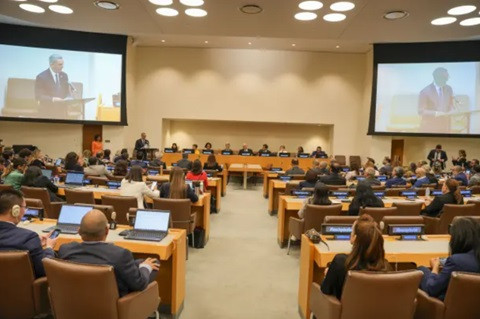


Dominican Republic, Chile and multilateral organizations highlighted education as a catalytic investment for the region's sustainable future
On the sidelines of the 79th session of the United Nations General Assembly and the Summit of the Future, the governments of the Dominican Republic and Chile, together with multilateral organizations, made an urgent call to increase financing for education in Latin America and the Caribbean.
The call to action, supported by UNICEF, UNESCO, ECLAC, the Inter-American Development Bank (IDB), the World Bank, the Development Bank of Latin America and the Caribbean (CAF), the Organization of Ibero-American States (OEI), the Latin American Campaign for the Right to Education (CLADE), and the Varkey Foundation, calls on countries to invest now to achieve Sustainable Development Goal 4, which seeks to ensure inclusive, equitable and quality education.
“Education is the driver of development and the key to transforming our societies; therefore, in the Dominican Republic we are determined to make schools the centre of development and public policies, where the future of our nation is forged,” said Luis Rodolfo Abinader Corona, President of the Dominican Republic. “We invite all sectors of society to join this effort. It is a commitment we must make together to ensure that education is, essentially, the pillar of equitable and sustainable development in our region.”
Nicolás Cataldo, Minister of Education of Chile, said, “As co-chairs of the SDG 4 High-Level Steering Committee, we believe that it is essential to participate in and promote initiatives like these to amplify decisions taken at the global and regional levels related to education. Reflecting on the enabling conditions for educational processes, and above all, sustainable financing, is crucial to move from commitment to action and ultimately to achieve the SDG 4 targets.”
In Latin America and the Caribbean, 75 per cent of students in the region do not achieve basic skills in mathematics and 50 per cent in reading. The limited realization of the right to education in the region has deepened in recent years due to prolonged crises, the impact of multiple emergencies, including the COVID-19 pandemic, and persistent inequalities.
"If you want economic success, if you want jobs, if you want growth, if you want investments, make sure your education system is delivering. There is no other way, right now," said economist Jeffrey Sachs.
Although countries have made significant efforts to reach the agreed minimum funding for education, at least 4 per cent of GDP and 15 per cent of total public expenditure, the sustainability of funding remains a challenge and the region is lagging behind. Currently, on average, Organisation for Economic Co-operation and Development (OECD) countries invest about five times more per student than the average for Latin America and the Caribbean.
For this reason, the Dominican Republic and Chile, together with the coalition of multilateral organizations, urge all governments in the region, international cooperation, civil society and the private sector to ensure enabling conditions and adequate, sustainable, equitable and efficient financing for education. In particular to:
Stefania Giannini, UNESCO Assistant Director-General for Education, during her presentation.

Naciones Unidas
"Education serves as an engine of inclusion, growth, and sustainable development. Through their Call to Action on Education Finance, Latin American countries have established a bold political and social pact to transform education,” said Stefania Giannini, UNESCO Assistant Director-General for Education. She invited all ministers and stakeholders to join the Call to Action.
Regarding this call to the countries, the Director of UNESCO’s Regional Office for Latin America and the Caribbean, Esther Kuisch Laroche, emphasized: "It is crucial that all stakeholders commit to mobilizing national and international resources, reforming their fiscal systems, and prioritising education on their political agendas. Only in this way can we ensure that no boy or girl is left behind, and that Latin America and the Caribbean can become a leading region in fulfilling the Sustainable Development Goals, especially SDG 4. This is our moment to act decisively and with a forward-looking vision, because investing in education is investing in a more just, peaceful, and sustainable world."
***